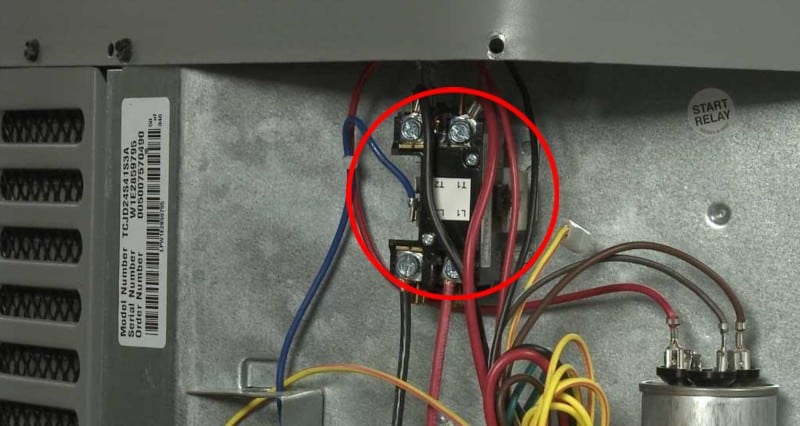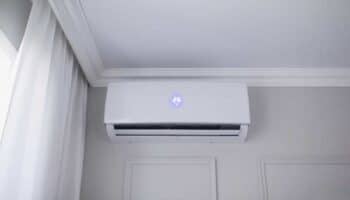We've independently reviewed this article to make sure it's as accurate as we can make it.
To find out more about our article creation and review process, check out our editorial guidelines.
Which is worse? An air conditioner that won’t start or an air conditioner that won’t turn off?
I guess the answer to that could entirely depend on what time of year it is! However, regardless of the time of year, it is a problem when you shut your thermostat off and your air conditioner keeps running.
Interestingly, there are multiple reasons behind an air conditioner refusing to shut off.
If your air conditioner won’t turn off then check for a faulty thermostat or damaged wiring, make sure your air conditioner is the right size for the room, and ensure the compressor contactor isn’t stuck.
We’ll dig into each of those solutions in detail below – and more.
HVAC Expert: It’s worth stating that an air conditioner running all day isn’t a bad thing. Air conditioners are sized depending on your region’s average temperatures. On a hot summer day, a perfectly sized air conditioner will run all day. This means it’s doing a good balance of cooling and dehumidifying. An air conditioner constantly cycling on and off can actually be a bigger issue if it’s oversized.
If you feel your AC is undersized, have a professional do a load calculation on your house.
Read on and let’s get your air conditioner to finally turn off.

Reasons Why Your Air Conditioner Won’t Shut Off
First of all, it’s not normal for your air conditioner to keep running.You have shut it off, so there’s some sort of problem with your system. It could be something simple to fix, or it could be a costly issue that will require either a technician or, unfortunately, a new system.
Let’s start with the simple fixes.
Your Thermostat Could Be Set To ON
Your thermostat has an ON or AUTOsetting and this setting operates your fan.
If you set it to ON, you’re requesting that the fan run continuously without stopping. It will run whether or not your air conditioner or furnace is cooling or heating your air, respectively.
When you have the thermostat set to AUTO, you’re telling the fan that you want it to turn on and off in sync with your furnace or air conditioner turning on or off.
Most new thermostats also have an additional feature called Circ (Circulation). This will circulate that fan at a predetermined program when your AC or heat doesn’t engage in a given time period.
Solution. If your air conditioner isn’t turning off, check to see if your thermostat is set to ON. if it is, you have discovered the problem. If it’s set to AUTO, you need to keep troubleshooting.
Faulty Thermostat
If your thermostat is defective, it will impact how your system runs. You can check for problems by cutting the power to your air handler. If your condenser—the outdoor unit—stops running when the power is cut, then the problem is with your thermostat or a wiring short.
If you are able to pull the face of the thermostat off, and the unit stops running, the issue is likely with the thermostat. If it continues running though, the problem is likely a wiring short or a problem with the outside unit.
Solution. If your condenser has stopped running, you may need to purchase and install a new thermostat. If the condenser is still running, you may have a problem with the wiring.
Damaged Or Loose Thermostat Wiring
How did things look when you had the thermostat off the wall and checked the yellow wire? Were any other wires loose?
Is any of the wiring that’s attached to your thermostat damaged? Or perhaps they are just old. Overtime, the sheath of insulation that goes around the wires deteriorates, and this will ultimately expose the wire itself.
If exposed wires touch each other and maintain a constant connection, this could keep your condenser running—meaning your air conditioner won’t turn off.
There are several things that can cause wire damage, but here are the most common:
- Accidentally putting a nail in the wall where wires are located
- Rodents in the walls chewing on your wires
- Outside wires can be hit by a weed whacker
- Faulty wiring, direct from the manufacturer
It’s easy to inspect for damage to your thermostat wiring. Simply take the thermostat cover off the wall by removing the screws that hold it there.Then you can do a visual inspection.
When it comes to electrical wiring, there are several warning signs you can look for.
Your outdoor wiring will be protected within a conduit housing. If you see damage to the housing, in all probability there may be damage to the wiring within as well.
Solution. If you’ve already ruled out a defective thermostat, and you’re sure the issue is with your thermostat’s wiring, you’re going to have to hire an electrician or an HVAC technician.
You call also follow this walkthrough.
Stuck Compressor Contactor
The contactor is an electrical component that controls electricity to your compressor. When the contactor is open, electricity is blocked from flowing to the motor. When it’s closed, it will allow electricity to flow.
When you turn your thermostat to cool, voltage is sent to the compressor contactor, making it close and powering things down. The problem is that over time your contactor contacts can stick together, typically because they heat up, thanks to the arc of electricity passing through them.
When the contactor can no longer disconnect, which in turn shuts off the power, your condenser will continue running even though the thermostat is telling it to shut off.
Solution. Depending on how badly the contactor is damaged, you may be able to fix it or it may need to be replaced.
First, make sure to turn off the power. Then you can try tapping on the contactor to see if that’s enough force to break them apart. If you can, take a small wire brush to clean them off.

If you want to get any replacement part – or see how much one would cost – click to enter your model number in the search bar below. Our partners at AppliancePartsPros stock almost every part with free guides on how to install them.

Hot Outdoor Temperatures
Clearly, you want your air conditioner to be on when it’s hot outside. But if your air conditioner is running constantly without turning off, it may be due to a few different issues.
If it’s hot outside but still within the average summer temperatures for where you live, there’s a good chance your air conditioner is undersized. If that is the case, there’s not much you can do about it.
Solution. Don’t worry, you don’t need to jump to buying a huge new air conditioner unit. The cheapest and most effective way to mitigate those hot days is to find ways to insulate your attic and/or reflect the radiant heat of the sun on the windows.
If the heat outside is well beyond what’s normal for your area and time of year, the issue is once again due to the size of your air conditioner. However, your air conditioner is likely sized properly, but only within historical average temperatures for your area.
Solution. If average temperatures for your area are increasing regularly, your options are the same as mentioned above.
Low Voltage Short
If you’re able to kill the power to the outside AC unit (normally there’s a shut off near the unit or via the breaker), listen closely to the unit.
If you hear a humming inside the unit, you have what is called a low voltage short – where the control power is still powering the Y wire. No humming means the contactor most likely needs to replace – which should be done by a professional.
How To Determine If Your Air Conditioner Is the Right Size
Many websites simply provide you with an estimate of what size your air conditioner should be. This estimate is based on where you live, the size of your home, and a few other factors.
However, this is not a completely accurate calculation. An HVAC professional will perform a load calculation on your home, which will determine the exact size your air conditioner should be. Unfortunately, this is a step that many HVAC salespeople skip.
For something a little better than an estimate, you can use this HVAC load calculator or you can get a reputable technician to come and do the much more complicated but precise calculation of your home and system.
Conclusion
We’ve discussed 5 reasons why your air conditioner won’t turn off.
To recap they are:
- Faulty thermostat
- Damaged or loose thermostat wiring
- Stuck compressor contactor
- Hot outdoor temperatures
With the exception of the last reason, most of the above can be dealt with by the homeowner at minimal expense. However, if a homeowner is uncomfortable dealing with any of these issues, they should contact a technician to do the work for them.
Hopefully, we’ve addressed your problem and one of these fixes has helped you.
While you’re here, why not check out our related posts below? Perhaps we can help you with something else.







